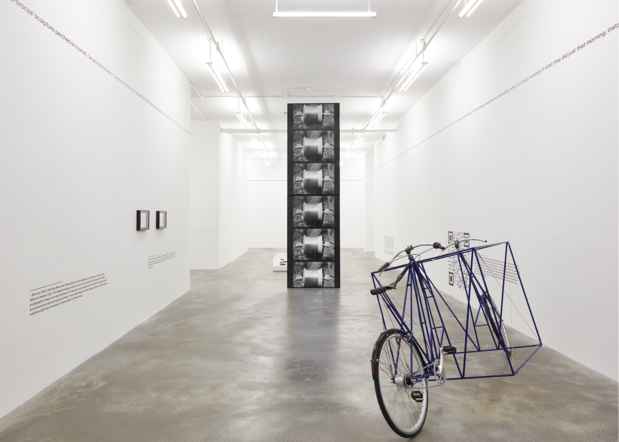Simon Starling “Two Birds, No Birds”
Casey Kaplan

This event has ended.
Two Birds, No Birds
Simon Starling with Emil Rønn Andersen
Simon Starling (b. 1967, Epsom, UK) reveals unexpected relationships within diverging histories. Guided by a cyclical rationale that has informed his practice for the last 30 years, Starling presents Two Birds, No Birds, a conflation of the material world of sculpture with the immaterial world of contemporary digital technology. Taking Constantin Brâncusi’s bronze sculpture Golden Bird (1919) as his point of departure, the artist entwines, overlaps, and uncovers the connections between past and present – the actual and the virtual – in a synthesis of sculpture, photography, film, and text.
Central to Starling’s seventh solo exhibition with the gallery is a new work created in collaboration with Danish artist Emil Rønn Andersen, Two Birds, No Birds – A Mirrored Displacement (Proposal for an Inter-Institutional Exchange)/Text (2022). In a progression from Starling’s previous bodies of work that drew directly from Brâncusi, such as Bird in Space (2004, presented at Casey Kaplan the same year) and Pictures for an Exhibition (2013-14, the artist’s 2014 solo exhibition at the Arts Club of Chicago), Starling recontextualizes an old narrative.
Lining the gallery walls is a fictitious scenario describing the symbiotic journeys of two separate copies of Golden Bird – one on view at the Minneapolis Institute of Art and the other at the Art Institute of Chicago. Each packed, crated, and shipped by air, the bronze sculptures pass each other mid-flight at exactly halfway between one museum and the other…in a fleeting and concurrent moment of existential dematerialization. So too does the text bisect the gallery walls, running along the central axis of the space as if to imitate the birds’ flight paths.
This imaginary journey is memorialized in two large photographs using DK179913, Rønn Andersen’s patented ‘technical arrangement,’ a revolving LED light source that projects images into space around objects. In this case, the two editions of Golden Bird in Chicago and Minneapolis coalesce during prolonged photographic exposures, resulting in hybrid images that appear to ‘teleport’ the sculptures from one institution to the other, most notably in the reflections of the birds’ polished bronze surfaces.
These reflective surfaces are echoed elsewhere in a series of new daguerreotypes, Recursive Plates (Still Life with Apples and Conkers or Silver Iodine Molecule Model) (2022). Similarly hybrid in nature, part age-old daguerreotype, part contemporary-composited digital image, these ghostly images are made on sheets of highly polished silver-plated copper and depict apples and conkers aligned to form a molecular model of silver iodine, the photosensitive compound with which the exposures are made.
Whereas Two Birds, No Birds proposes the movement of sculptures from one museum to another, the project Carbon (Hagen – Essen) (2022) marks the 100th anniversary of the relocation of an entire museum: the Museum Folkwang, one of Europe’s first museums of contemporary art, which moved from Hagen to Essen in 1922. On August 6, 2022, a steam locomotive (DB 78 468), represented here as a quarter-inch scale O gauge model, retraced the route. This commemorative journey was fueled exclusively by charcoal produced from seven cubic meters of timber cut at the wooded site of an unbuilt art school, the Folkwangschule, Hagen, designed in 1920 by Bruno Taut for the museum’s founder Karl Osthaus.
Transmutations of objects in space, and in transit, can be seen throughout Two Birds, No Birds. Starling’s The Endless Cubic Metre (Ultra Marine) (2022) occupies floor space in a nod to Michelangelo Pistoletto’s so-called “Minus Objects”, Metrocubo d’Infinito (Cubic Metre of Infinity) (1966), a six-sided cube of inward-looking mirrors. In contrast, Starling’s sculpture is both aesthetic and functional, created by inserting a cubic meter into the triangulated geometry of a bicycle frame. Drawing from a bicycle designed by Danish engineer Mikael Pedersen circa 1910 with reference to the Whipple-Murphy bridge truss, Starling’s peculiar reworking of this little-known design classic is in fact rideable and served as transport for the artist’s trek between two celebrated New York cubes: Isamu Noguchi’s Red Cube (1968) located at 140 Broadway and Tony Rosenthal’s Alamo, aka the Astor Place Cube (1967). A square meter-sized QR code links viewers to documentation of the short voyage.
Gauge (2021), originally realized as part of the Oku Noto Triennale as a public work on an abandoned railway line on the Oku Noto Peninsular in Japan, is shown here for the first time as a stacked progression of film frames on a vertiginous screen. It is a single 400ft-long roll of silver-based 35mm black-and-white film, equating to the measurement of 400ft of railway track on Berlin’s long-defunct Friedhofsbahn (Graveyard Train) with a 400ft length of silver extruded from a 5kg ingot. These interrelated components – 5kg of railway track along with 400ft of both silver and film material – are physically present within the exhibition as if, like all the subjects of Two Birds, No Birds, they are participating in an invented pilgrimage that ends where the physical and the digital converge.
Media
Schedule
from January 19, 2023 to March 04, 2023